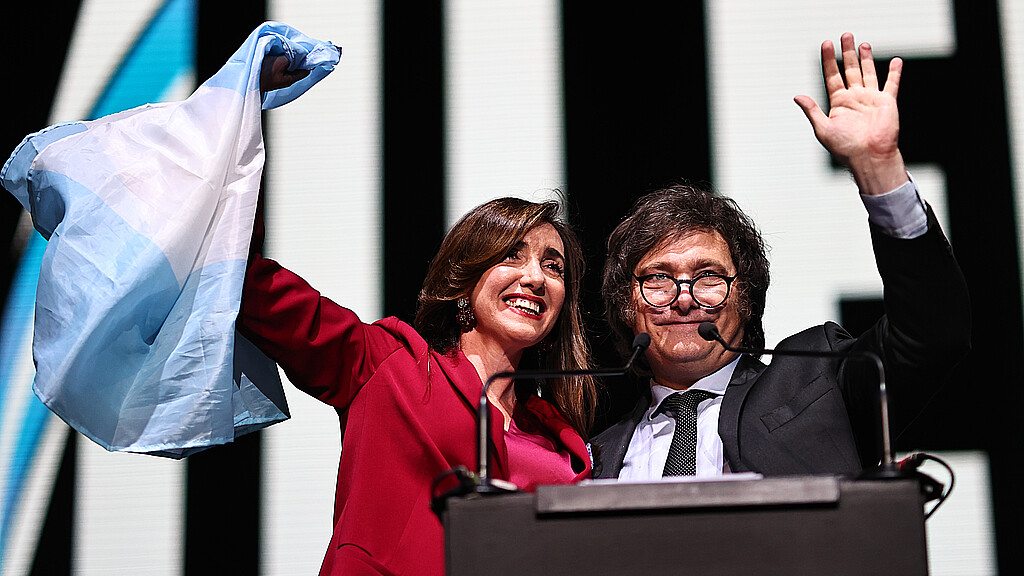Opinion & Reviews
Javier Milei: The first 100 days of a new Argentina... the voice of reason cannot be denied
What started as a social media icon turned into the first libertarian government, with a strong patriotic vice president to win the conservative vote. After 100 days in office, Javier Milei and Victoria Villarruel remain popular yet with many obstacles in their path.

April 9, 2024 2:11pm
Updated: April 9, 2024 2:11pm
What started as a social media icon turned into the first libertarian government, with a strong patriotic vice president to win the conservative vote. After 100 days in office, Javier Milei and Victoria Villarruel remain popular yet with many obstacles in their path.
So far, the most outstanding part of their first trimester in power has been an acknowledgment on behalf of The Economist. The renowned British media outlet published an article analyzing the Argentinian government’s performance.
Here's what The Economist—and ADN America has to say.
“After 100 days (Milei) can boast of true economic success”
“After 100 days (Milei) can boast of true economic success,” says The Economist. It’s worth mentioning that The Economist, after almost 200 years of publishing, took a steep turn in its political direction after Donald Trump’s presidency. The publication went from being economically to politically driven and openly against the American president.
However, the pendulum has once again turned back.
The editorial piece about Milei mostly highlighted the positive aspects of the new president’s decision-making. In a step towards its roots, The Economist focused on the economy, both the good and the bad.
“His popularity remains even when he lacks support in Congress. If he can keep the public on his side until the midterm elections late next year, it could dramatically strengthen his influence and, therefore, his ability to remake Argentina's economy. But Argentines are already suffering deeply and could abandon it much sooner. That would be a blow to radical reformers around the world,” continues the article.
Among the “economic successes” that the article mentions is the fact that there will be no more money printing.
According to The Economist, “To prove that there will be no more money printing, Milei is obsessed with achieving a budget surplus, meaning the government taxes more than it spends. He says he will achieve a surplus (before interest payments) this year of 2% of GDP (Gross Domestic Product), a big change from last year's 3% deficit. In both January and February, the government achieved monthly surpluses, the first in more than a decade.”
Using a visual reference, Milei´s acclaimed “chainsaw,” the piece refers to subsidy cuts in energy and transportation, while transferring those costs to the local governments (provinces).
Though this is a clear cut for the government it hurts the pocket of the average citizen. However on an international scale the costs are still very low. At the beginning of the current government, the average bus fare ranged at only a U.S. nickel, yes: just 5 American cents.
It now went up to around 30 cents. Even though it is an increase of 600% it is still low in comparison.
Buses in New York, for instance, can go all the way up to $7 dollars (the express line) and as low as 1.25 for senior citizens. Yet, while the minimum wage is $15 dollars per hour in New York it is $1 dollar in Argentina.
Though this transportation cost increase hurts the average citizen it is also a sign that anger is nowhere near its peak.
Comparing Milei's Argentina to neighboring South American countries
Compared to neighboring Chile, where in October 2019 the metro price increased 4 cents per ticket and the capital burned in flames. Of course it’s worth mentioning that this period was known as the “Bolivarian breeze” instigated from Venezuela (with Venezuelan and Cuban citizens detained for their involvement in the arson and looting). The “breeze” spread all the way to Ecuador and Colombia where there were also protests due to cuts in subsidies.
It is also worth mentioning that now that the political left is in power in Chile, there were no violent protests against the increase in bus fares. The president himself was an avid demonstrator in his years as a student, which lead him to the presidency. When the right is in power, the left agitates. When the left is in power, the agitators become complacent.
Milei, however, was clever enough to issue a law that restrained riots in a way that the right to protest while allowing free transit to those who are not involved. This means that his opposition can march against his government yet not break the law.
Life goes on, they can no longer close streets and the police can restrain rioters. In fact, there are now fines for those who break the law during a protest. There are also loud speakers that announce a “hotline” where people can denounce if they are being pressured or even extorted in order to riot. That had been going on for years. People were both paid and or threatened to riot. So far, there have been demonstrations against the government but within the parameters of the law.
Speaking of protests, while Cuba is in uproar against the communist regime, Milei has openly declared his position publicly in support of the citizens on the streets. This has motivated the protesters and has legitimized them as well.
That is Milei’s strongest aspect: discourse. His fight against socialism and globalism has been the forefront of his government, with its climax at the World Economic Forum. But it’s not an easy path, as he still does not have a majority in Congress, which makes it difficult to pass any law and inspirations words don’t solve hunger in an impoverished nation.
Yet, so far, he is still internationally acclaimed.
Mamela Fiallo is a university professor, translator, interpreter, and co-founder of the Cuban Libertarian Party. She is the author of “Igniting Liberty: Voices for Freedom Around the World.”







